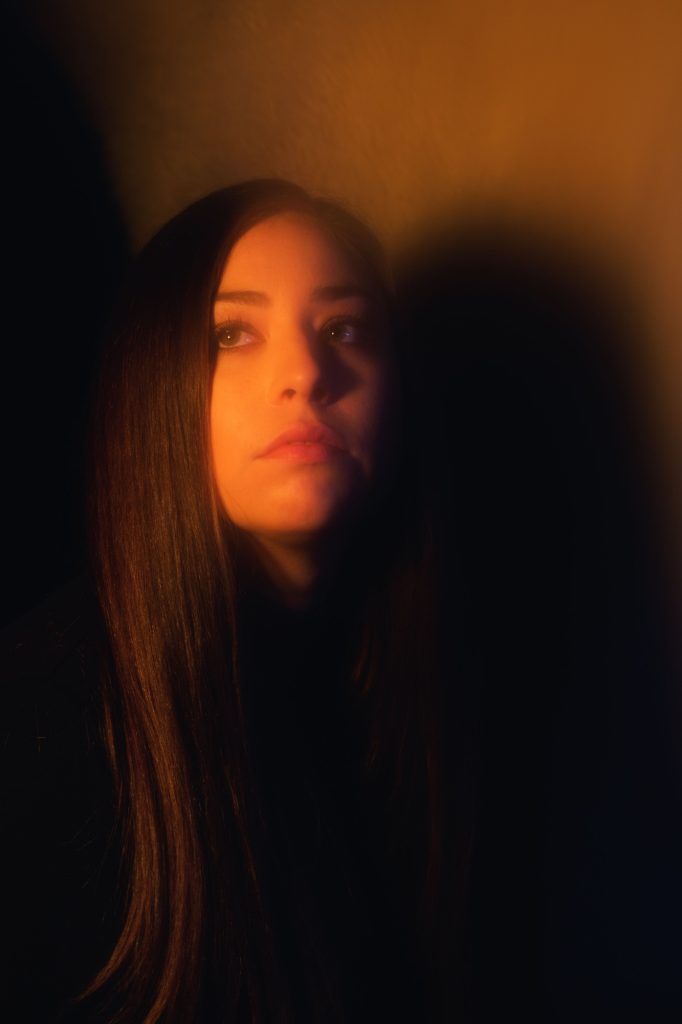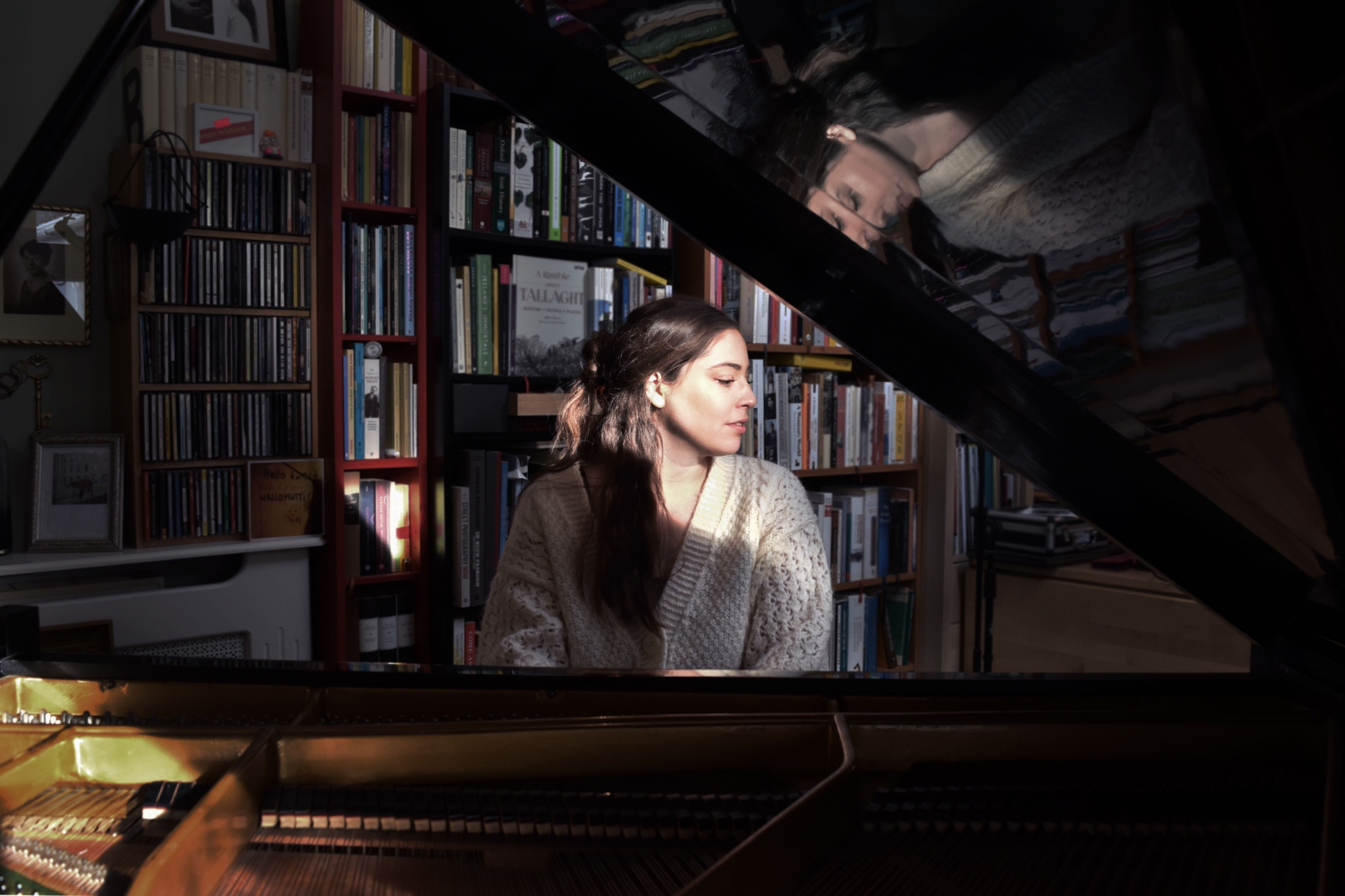Today, the Galway-born-and-raised Roisin Lowry is a very accomplished musician. As a primary school-aged child, she learnt the fiddle and later classical piano and vocals, performed with and wrote for various acts, studied and earned undergraduate and postgraduate degrees in both Ireland and the UK in Music and Piano Performance, and has taught music to children, adolescents and adults for over a decade.
“At a young age, it would have been trad sessions,” Roisin tells Post-Burnout of how she first got into music. “We would’ve played at them, but we would’ve went to see them, as well. So, that would have been the first performing in front of people I would’ve done, playing the fiddle and playing in sessions. So, it would’ve been a bit more informal – like, everyone playing something and kind of joining in.
“So, that was nice because you’re playing in front of an audience from an early age, so it’s less of a big thing when you go to do it. I still get very nervous, but you’re kind of used to doing it, I suppose. And then, in secondary school, I would’ve played a little bit as well with other people, and that would’ve been a lot of trad stuff, but also, more pop, contemporary stuff, as well. So, I was kind of playing from a young age. Not in front of big audiences or anything, but in front of small groups.”
At 19, Roisin took her love of music to the next level when she enrolled at the University of College Cork, where she would earn a Bachelor’s in Music. The course allowed her to discover a lot of music she had hitherto been unaware of and the opportunity to mingle with a plethora of students with different backgrounds and interests. It also illustrated to Roisin how limited her exposure to music had been.
“I think ‘limited’ in terms of my knowledge of what actually existed, but also, my knowledge of what I thought music was was very confined,” Roisin says. “Then you start to realise, ‘Oh, there’s all of these other types of music, types of cultures.’ You start to look at it, and you’ve never even heard it before, it’s totally new to you. And, also, different perspectives from other people, as well. So, yeah, I would definitely say limited.
“I would say my performance was very good at the time because I was playing so much and I was really preparing for that. So, I would say I was a really good player, and possibly more than I am now, to be honest, because I was playing a lot more then, but my overall understanding of lots of different music was limited, I would say, for sure.”

Courtesy of VETA Music
Around this time, Roisin was also self-discovering some music that ignited her. “I think I didn’t really start to discover music that I really liked until I was a bit older,” she says. “I suppose, when I was younger, we had limited access to the internet and things like that, so you were listening to what was on the radio, and what your friends were listening to, and what your parents were listening to and stuff like that, so it really wasn’t until I was maybe a teenager or even later than that – like, in my early twenties – when you could go on YouTube and stuff, and find music that you could go, ‘Oh, this is actually really interesting.’
“And it was only really then that I started discovering people like Agnes Obel, Olafur Arnalds, Max Richter, or people who were doing that sort of contemporary classical, kind of folk classical, and that’s what I was really interested in, but I actually hadn’t really heard anyone doing that until I was, maybe, in my early twenties, and that’s when I started to go, ‘Oh, maybe I could do something like that, as well.’”
This influence was the impetus for her current solo project, Lõwli, which she began in 2016. “That’s when I started writing my own stuff to myself,” she says. “I had done a little bit of writing with other people, but not really fully for myself. So, I started writing, kind of trying to incorporate more classical elements into the music. That didn’t happen straight away, though; that kind of happened after, but that was always something I was interested in because I had learnt classical piano, and I noticed that a lot of people playing piano, it was very pop-focused and there wasn’t the same classical element, so I thought it would be really interesting to integrate that into it and it almost kind of happened organically, anyway, without me really being aware of it, so I thought I’d embrace that.
“There are a lot of different things going on with it; it’s really hard to define the genre or the style. There’s definitely a lot of different influences, and it’s even hard for me. I find it hard to describe it because it’s just really difficult. [Laughs] But, I think, for me, the strongest influences would be that sort of contemporary classical element with the piano and instrumental ones, anyway, and then there’s definitely an element of folk, for sure. Maybe a little element of pop, but maybe a little bit darker. So, dark pop, dark folk, kind of contemporary classical, and maybe a little bit of traditional elements creeping in there a bit! [Laughs] People say that to me. I’m unaware of it, but, yeah, it must be happening!’”
Last month, Lõwli released their latest single, “Undone,” which perfectly illustrates the glassy, delicate and foreboding arrangements the project is known for. “This is the first track from a ten-track album,” Roisin says. “I haven’t really announced the album yet, but I will, maybe, in the summer.
“That’s the first one. I have another three songs coming out over the year, and then the album will be out in October, so that’s the plan. I recorded the album over the last couple of years. I feel like it’s taken a long time between starting to write it and…I’d say the first songs from that album were probably written about 2020, so it has been a long time [Laughs] getting everything ready, getting it recorded, the postproduction, and then getting it ready for release, so it’s nice that it’s starting to get released. [Laughs] At long last!”
Roisin worked closely with the engineer Edu Prado to finely craft the record’s perfectly imperfect sound. On the creation, Roisin says, “I suppose I had a good idea of all of the tracks before I recorded anything. Some of them, I was still sort of writing and arranging them, but I had the songs pretty much there or nearly there.
“It was done over the course of about, I’d say, a year. Maybe a little bit less than a year, the actual recording part of it. So, we recorded the piano, strings, [and] vocals in a studio in Wicklow called Treehouse Studios. A really lovely studio, a really lovely piano. So, we have that real kind of authentic piano sound, which is really what I wanted for this.
“We did that in sessions. I think we probably went in, maybe, four or five times, and maybe two days in a row or three days in a row, and recorded all that. Then we did some stuff at home, here. We did double bass here, some kind of little sound effect things, like little small things to add in, which feature on more of the tracks; not so much on ‘Undone,’ the one I’ve just released. And drums, we recorded in Limerick. So, we did that over a day in Limerick.
“So, there was a few different sessions, and I kind of spread them out, just so I had time to make sure that it was all right and that I had time to get everything together… – because I would write the string parts and I would orchestrate all that stuff – …so, just to make sure I had all of that ready and that I was prepared for it.
“And the postproduction, that took a while, as well, because I was trying to figure out if I wanted to add any other stuff. There was a time when I wanted to add some kind of electronica stuff, and I wanted to see if that worked, and we kind of spent a while trying to figure that out and adding different things, and then we kind of realised that it worked on some, like really subtle stuff, but, actually, I ended up being like, ‘Maybe this actually isn’t the right thing at all. Maybe this isn’t the direction for this particular record.’ So, it was kind of about trying things and then discovering that some of those things, maybe, didn’t work. Some of them did, you know? So, that was the process, more or less.”
A word that often crops up when describing Lõwli’s music is Cinematic. With that in mind, we ask Roisin if the album will have a filmic throughline. “The whole concept of the record is an introspective journey,” Roisin responds. “I wanted for it to start darker and end in a slightly more optimistic way, but it not to have this linear path, so there’s a balance there. It goes from different moods. It’s not this straight line from one perspective to the other. So, they are linked in that way.
“There’s also lyrics that are linked, as well, in certain ones. Like, just small, little hints of links between the songs. And even things like the keys of the songs, I did that in a way where the keys at the start are sort of a little bit darker, they’re kind of more like flat keys, and then the ones at the end are sort of less so. They’re what I would consider to be slightly brighter keys, although I know that’s kind of a subjective thing, as well. So, there’s kind of a journey there, from start to finish, in that sense. So, they are linked in that way, but, at the same time, some of the songs have their own stories, as well.”
With the album scheduled to be out by the end of the year, we conclude the interview by asking Roisin what plans she has for Lõwli in 2025. She responds, “The next single will be out in April, but I haven’t announced that either. [Laughs] So, lots of new music coming. Gigs, as well. There will be gigs coming up at the end of the year to launch the music.”
Lõwli’s latest single, “Undone,” is on all streaming platforms now. You can keep up to date with the project through Linktree.
Tune into POSTBURNOUT.COM Interviews… tonight at 21:00 (IST) to hear this interview in full. Available on YouTube, Spotify, Apple Podcasts, and Amazon Music Podcasts.

Aaron Kavanagh is the Founder and Editor-in-Chief of Post-Burnout. His writing can also be found in the Irish Daily Star, Buzz.ie, Totally Dublin, The GOO, Headstuff, New Noise Magazine, XS Noize, DSCVRD and more.

 POST-BURNOUT
POST-BURNOUT